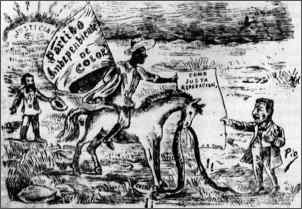Driven by the prospects of emancipation and an opportunity to play a prominent role in nation building, Afro-Cubans enthusiastically joined the struggle for independence against Spain. But any hopes for racial democracy were curbed shortly following with the U.S. military presence in Cuba from 1898 to 1902 and again from 1906 to 1908 that emboldened the conservative ruling class, who pursued policies that actively sought a "whitening" of the nation (
blanqueamiento) by subsidizing immigration from Europe, mostly Spain, and extricating blacks and mulattos from every aspect of national life. Cuban elites of the early twentieth century viewed Afro-Cuban cultural forms as the antithesis of European civilization and progress they sought to impose on their unruly societies. To be sure, the specter of an Afro-Cuban uprising styled after the Haitian Revolution—a common fear among the ruling establishment in many colonial societies—also animated this policy of whitening. More than 600,000 Spaniards are estimated to have immigrated to Cuba between 1902 and 1931, and while 'whitening' lost all intellectual respectability in the wake of the death of scientific racism in the 1940s, it did serve to shift the demographics of Cuba, as the island nation was one of the more Spanish of the Latin American republics. But most damaging effects of whitening to the social and economic fabric of the young nation was the further marginalization of blacks and mulattos, which contributed to an internalized oppression.

In response to the perceived “black problem” of the early twentieth century and its attendant racism, leaders who formed the Committee of Veterans of Color in the early years of the republic broke with the
Liberal Party in 1908 to found the first black political party in the New World, the Partido Independiente de Color (
Independent Party of Color), and fight for self-determination and racial equality. The party platform demanded equal participation in government, an end to racial discrimination in access to education and government jobs by Afro-Cubans, and an end to the ban on "non-white" immigration. Party members viewed the myth of racial democracy as working against blacks and mulattos by silencing and deracializing Cubans. After a racist government propaganda campaign that stoked fears of a race war, the legality of the Partido Independiente de Color was under attack with passage of the Morúa Law in 1909 that banned political parties based on race or class, and a demonstration against this prohibition in 1912 provoked a harsh repression by government forces. The leaders of the movement, Evaristo Estenoz and Pedro Ivonet, together with a number of other veterans of the
War of Independence, were killed in what is known as the
Race War of 1912. All told, more than 3000 blacks and mulattos were massacred in Oriente, and black people across the young nation were detained, harassed, and terrorized.
While the Race War of 1912 represented a nadir in Cuban race relations, it was followed by the progressive emergence of an Afro-Cuban middle class that criticized Cuban racism, advocated self-improvement in the black community, encouraged African diasporic solidarity, and called for political and cultural agency. As a product of this period of cultural renewal, the
afrocubanismo, or
negrismo (
négritude), movement took shape to celebrate Afro-Cuban cultural expressions while seeking to reconstruct a national identity that reflected Cuba's rich African heritage. The movement would spawn a diversity of art and literature, from the magical realism of
Alejo Carpentier and the radical Afrocentric poetry of
Nicolás Guillén.


